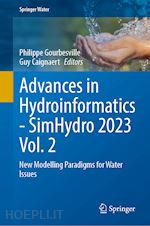
Questo prodotto usufruisce delle SPEDIZIONI GRATIS
selezionando l'opzione Corriere Veloce in fase di ordine.
Pagabile anche con Carta della cultura giovani e del merito, 18App Bonus Cultura e Carta del Docente
This book includes a collection of extended papers based on presentations given during the SimHydro 2023 conference, held in EDF Lab Chatou, France, with the support of Société Hydrotechnique de France (SHF), the Association Française de Mécanique (AFM), the Environmental and Water Resources Institute (EWRI), and the International Association for Hydro-Environment Engineering and Research (IAHR). SimHydro conferences, since 2010, have created a regular forum where major actors of the hydroinformatics domain and stakeholders meet, share, and debate about needs, innovations, and implementations of models and their inputs for decision making. For this new edition, the general theme of the conference is focused on “New modelling paradigms for water issues”. The papers address some of the key challenges faced by the water modelling community regarding processes to simulate such as water services, extreme events (floods, droughts, etc.), and hydrological cycle at catchment scale and to assess the added value of emerging concepts and methods such as Artificial Intelligence (AI) and Digital Twins that are gaining interests. It addresses the interests of practitioners, stakeholders, researchers, and engineers active in this field.
This book represents Volume 2 of a two-volume book series.
LSTM Networks for Catchment Response Simulation.- Which framework for optimal low flow modelling in a warming climate ?.- Uncovering a palaeotsunami triggered by mass movement in an alpine lake.- Telemac- 2d upgrades: rainfall spatialization and control sections.- Analyses of rainfall trends in vu gia-thu bon river basin.- Use of free software and ai as a support tool for hydrology: graphical representations.- On the application of physics-informed neural networks in the modeling of roll waves.- Impact of training dataset size and its hydrometeorological typology on LSTM performance for Rainfall-Runoff modeling : A case study of the Severn River (UK).- Design flows of the Tlautla gauging station, Hidalgo, Mexico with flow analysis,- Decoupling Performance and Flexibility within hms++: A User-Friendly Shallow Water Equations Solver with Advanced CPU Optimisations and an Extensible Design.- Dynamic Calibration in Hydrological and Hydraulic Modelling: Exploring the Potential of Data Assimilation for Estimation of Models’ parameters.- Digital twins applied to natural hydrosystems: a review.











Il sito utilizza cookie ed altri strumenti di tracciamento che raccolgono informazioni dal dispositivo dell’utente. Oltre ai cookie tecnici ed analitici aggregati, strettamente necessari per il funzionamento di questo sito web, previo consenso dell’utente possono essere installati cookie di profilazione e marketing e cookie dei social media. Cliccando su “Accetto tutti i cookie” saranno attivate tutte le categorie di cookie. Per accettare solo deterninate categorie di cookie, cliccare invece su “Impostazioni cookie”. Chiudendo il banner o continuando a navigare saranno installati solo cookie tecnici. Per maggiori dettagli, consultare la Cookie Policy.